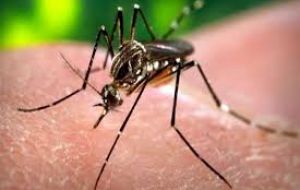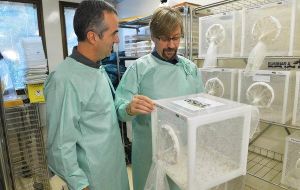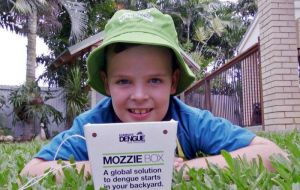MercoPress. South Atlantic News Agency
Dengue viral infection fought off with special mosquitoes in Australian city
 The captive-bred mosquitoes were released in the city of Townsville, Queensland, 187.000 population, where they mated with local mosquitoes.
The captive-bred mosquitoes were released in the city of Townsville, Queensland, 187.000 population, where they mated with local mosquitoes.  They were infected with naturally occurring Wolbachia bacteria, which makes them unable to transmit viruses
They were infected with naturally occurring Wolbachia bacteria, which makes them unable to transmit viruses  The project has reportedly stopped all outbreaks of dengue fever in the city for the last four years
The project has reportedly stopped all outbreaks of dengue fever in the city for the last four years A deployment of special mosquitoes in Australia has for the first time protected an entire city from the viral infection dengue. The captive-bred mosquitoes were released in the city of Townsville, Queensland, where they mated with local mosquitoes.
They had been infected with naturally occurring Wolbachia bacteria, which makes them unable to transmit viruses. The project has reportedly stopped all outbreaks of dengue fever in the city for the last four years. Zika and malaria hope Researchers from Monash University hope their work could provide a knockout blow to the mosquito-borne diseases Zika and malaria.
“Nothing we’ve got is slowing these diseases down – they are getting worse,” said Scott O’Neill, director of the World Mosquito Program. “I think we’ve got something here that’s going to have a significant impact and I think this study is the first indication that it’s looking very promising.”
Over four monsoon seasons, researchers let loose the Wolbachia-carrying mosquitoes across 66km sq in the Queensland town with a population of 187,000 people. The community embraced the project, with even school children taking part by releasing the special mosquitoes that passed on their bacteria to the local mosquito population. Ongoing protection
“At a cost of around A$15 (£8.50) per person, the Townsville trial demonstrates the approach can be rolled out quickly, efficiently and cost effectively to help provide communities ongoing protection from mosquito-borne diseases,” said Professor O’Neill. The project has been hailed as a success, with its results published on the Gates Open Research site, set up by its biggest funder.
The program is currently working in cities in 11 countries, including in Rio de Janeiro in Brazil, Medellin in Colombia, and Yogyakarta in Indonesia, where the communities there are said to have embraced the work. The team hopes the program can be made available for a cost of USD$1 (75p) per inhabitant in cities in poorer parts of the world. If safe and effective over a longer period, Wolbachia may be used to combat malaria.
In 2016, there were 216 million cases of malaria worldwide and 445,000 deaths. “There is lab data showing this approach could be effective in malaria as well, but that is much further upstream,” said Professor O’Neill.




Top Comments
Disclaimer & comment rulesCommenting for this story is now closed.
If you have a Facebook account, become a fan and comment on our Facebook Page!